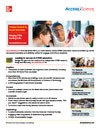In humans, taste buds on the tongue have sensory receptors that detect the qualities of water-soluble chemicals in food and convert (or transduce) those stimuli to electrical signals. Nerves then carry the signals to the brain, which processes them and evokes perceptions of the taste qualities of foods, such as sweetness, sourness, saltiness, bitterness, and umami (savoriness). The sensing mechanism of taste is one means by which humans are able to recognize whether food is safe for consumption or spoiled and unsafe. Humans (professional tasters) have long been used in industry to help evaluate the quality of manufactured foods and beverages because the acuteness and complexity of the sense of taste can convey information that other analytical instrumentation cannot. See also: Analytical chemistry; Chemoreception; Food manufacturing; Food science; Sensation; Sense organ; Signal transduction; Taste; Tongue; Umami taste receptor
An electronic tongue is a kind of biosensor that simulates the tasting abilities of the human tongue. It has an array of chemical sensors that can interact with salts, sugars, bitter molecules, and other chemicals in a liquid sample and can send electrical signals to a computer for mathematical and statistical analysis to extract taste information. For example, one type of electronic tongue uses lipid membranes as sensors: salts, sugars, and other taste compounds interact with the membrane and change its electrical potential in telltale ways. See also: Bioelectronics; Biosensor; Lipid; Membrane mimetic chemistry; Microsensor; Transducer
Electronic tongues do not identify specific compounds. Instead, they are calibrated against known samples and provide taste profiles of new ones. They can monitor the shifting balance of sweetness and sourness (acidity) in fresh apple juice as it ages and degrades, for example. Instruments with taste-sensing abilities have started to find a place in the food industry, although a fully capable electronic tongue has not yet been achieved. In another potential application, the pharmaceutical industry is investigating the use of electronic tongues to evaluate the bitterness of pharmaceuticals as a step toward improving their taste. See also: Chemometrics; Food stability





